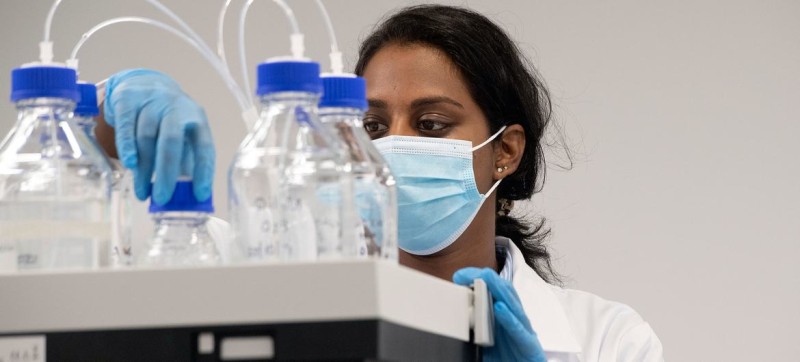
MPP/WHO/Rodger Bosch A lab worker in the mRNA technology transfer hub in South Africa, one of the countries selected to establish mRNA vaccine production.
Over 200 international participants working with the mRNA Technology Transfer Programme had their first face-to-face meeting, in a bid to make one of the most revolutionary medical technologies which led the field in vaccine development against COVID-19, more widely and fairly available, in the places where it is most needed.
‘Lifesaving’ breakthrough: Tedros
“I am delighted to be here in Cape Town with our partners to support a sustainable model for mRNA technology transfer to give low and middle-income countries (LMICs) equitable access to vaccines and other lifesaving health products,” said WHO Director-General Dr Tedros Adhanom Ghebreyesus.
“I am immensely proud of the achievement of all those involved in this project; in less than two years we have shown that when we work collaboratively, we succeed collectively.”
Tedros was joined for the launch by South African ministers Dr. Joe Phaahla and Ebrahim Patel, together with high-level officials from funding countries, to review the progress of the programme, launched by WHO and the Medicines Patent Pool (MPP), in June 2021.
The meeting participants include partners from 15 countries in the programme, leading experts, industry, civil society representatives, and funders.
During the five-day meeting, participants will share progress and discuss critical enablers for the sustainability of the programme such as intellectual property issues and regulatory aspects, as well as the science of mRNA technologies and key applications relevant to other disease areas such as HIV and tuberculosis.
Vaccine equity
The COVID-19 pandemic has underscored that inequity exists in access to many health products, especially vaccines. As of March this year, more than three years after WHO declared COVID-19 a Public Health Emergency of International Concern (PHEIC), 69.7 per cent of the global population had received at least one dose of a COVID-19 vaccine.
However, this proportion remains below 30 per cent in low-income countries (LICs).
This programme aims to contribute to equitable access to mRNA vaccines by increasing the distribution of sustainable manufacturing capacity across LMICs, enhancing regional and inter-regional collaboration, and developing and empowering a local workforce through tailored and inclusive training and expert support.
Dr. Phaahla, Minister of Health South Africa, said: “What we see here today, is a moment in history, a programme that is aimed at empowering LMICs through a global collaborative network.
‘Thrilling’ progress
“I am thrilled to see the progress made in such a relatively short time and welcome the support from so many different countries – countries like South Africa that have a strong vibrant biomanufacturing capacity and that are willing to work together, learn from and share with each other.”
Afrigen in Cape Town and local vaccine maker Biovac were chosen last year by WHO for the pilot project to give LMICs the technological know-how and licences to manufacture COVID vaccines, and Afrigen has used mRNA sequencing to produce its own version of the inoculation, known as AfriVac 2121, and is currently scaling up that process to a level suitable for manufacturing vaccine batches to be used in Phase I/ II clinical trials to GMP standards.
In a parallel process, Afrigen will continue to carry out training and technology transfer to network partners.
According to news reports, the vaccine candidate will move to the human testing phase, in early 2024.

